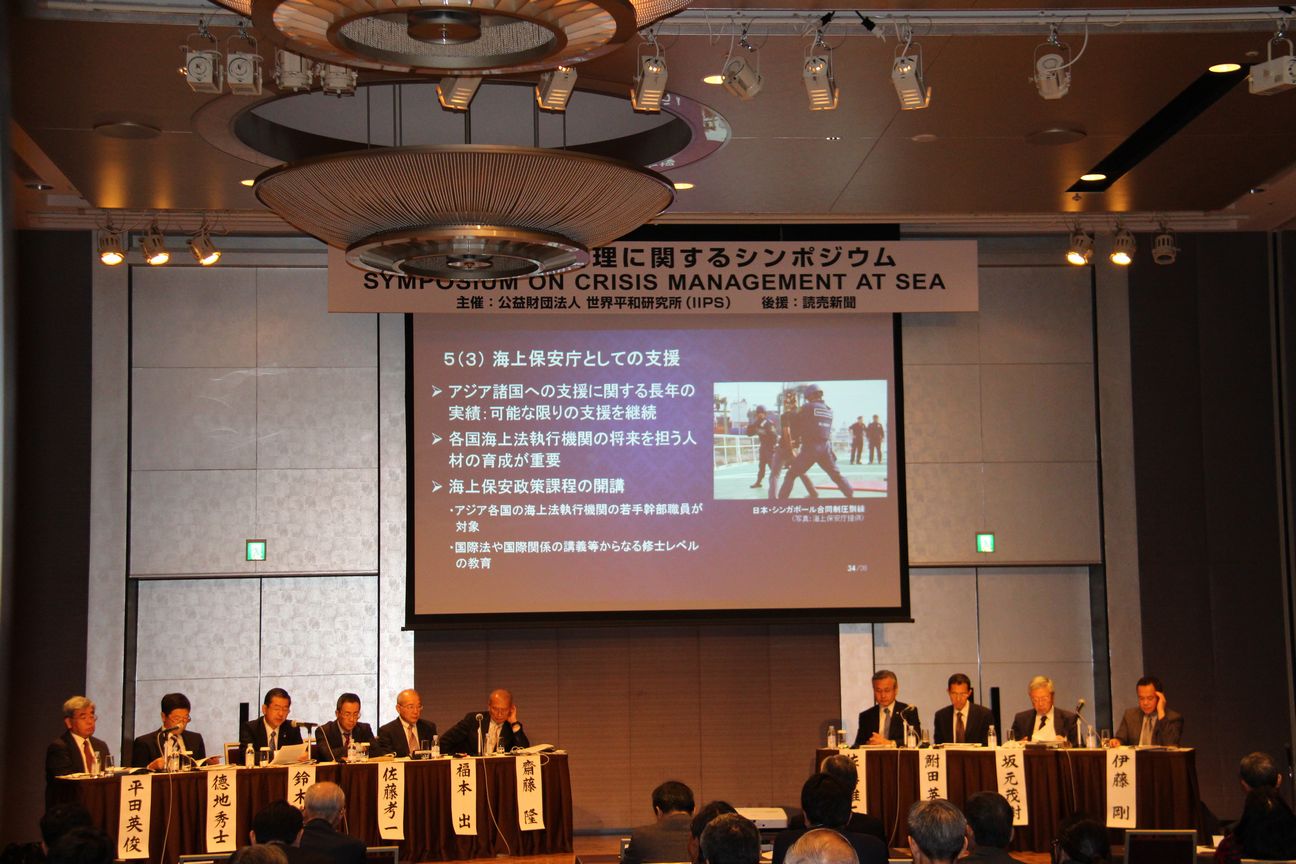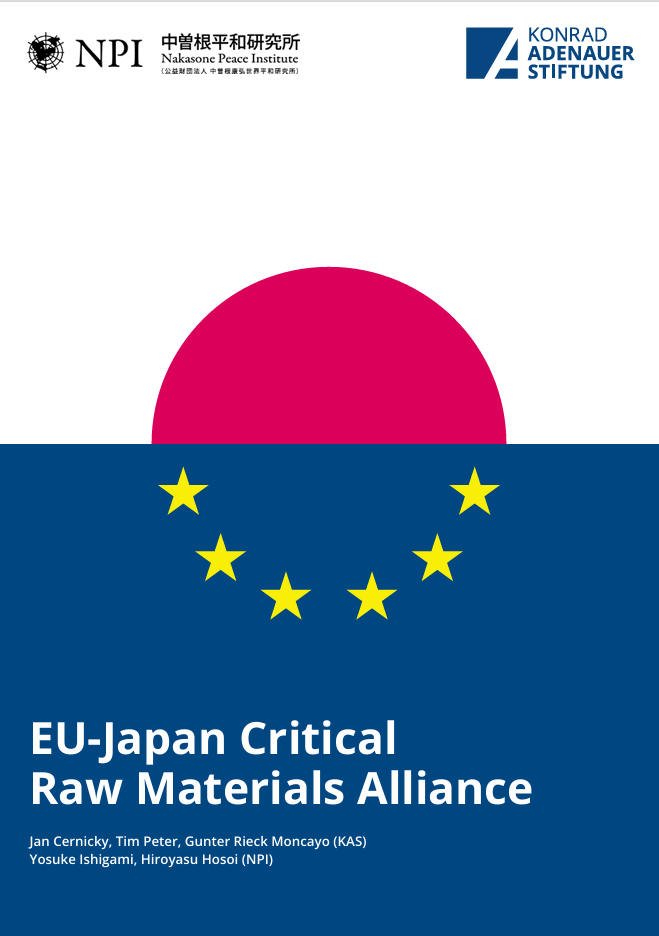2016/11/18
Symposium on Crisis Management at Sea: Urgent Proposals from the Field, 28 October 2016
28 October 2016
Symposium on Crisis Management at Sea: Urgent Proposals from the Field
In March 2016, IIPS formed a Study Group on Maritime Security in East Asia consisting of former top-level officers and officials of the Japanese Self-Defense Forces, Ministry of Defense and Coast Guard, as well as a senior academic. The purpose was to consider ways to translate into action the "Yasuhiro Nakasone Proposal on Maritime Security in East Asia", announced in December 2015. The Study Group completed a Reportconsisting of the following main points.
1. Follow-up to the Yasuhiro Nakasone Proposal
2. Pressing issues regarding maritime security
3. Crisis Management for Maritime Security (First Recommendation)
4. Capacity-Building in the Field of Maritime Security (Second Recommendation)
5. Efforts on the part of Japan
6. The case for OMSEA: streamlining pluralistic efforts and promotion of regional integration
The Study Group hosted a symposium in Tokyo on 28 October 2016 and presented this Report. Four maritime specialists were invited as guest speakers and commented on the Report. More than one hundred people, including members of the diplomatic corps stationed in Tokyo, attended the symposium. (Members of the Study Group and guest speakers are as follows.)
IIPS Study Group on Maritime Security in East Asia:
Head of Study Group: Takashi SAITO, Admiral (ret), former Chief of Staff, Joint Staff of Japan Self-Defense Forces
Deputy Head: Izuru FUKUMOTO, Vice Admiral (ret), former President, Japan Maritime Self-Defense Force Command and Staff College
Koichi SATO, Professor, J. F. Oberlin University, Tokyo
Hiroshi SUZUKI, former Vice Commandant for Operations, Japan Coast Guard
Hideshi TOKUCHI, former Vice-Minister of Defense for International Affairs
Hidetoshi HIRATA, Lieutenant General (ret), former Commander, Air Training Command, Japan Air Self -Defense Force
Guest speakers:
Yuji SATO, Former Commandant, Japan Coast Guard
Shigeki SAKAMOTO, Professor, Doshisha University, Kyoto
Eiichi FUNADA, Vice Admiral (ret), former Commander in Chief of the Self Defense Fleet
Go ITO, Professor, Meiji University, Tokyo
In his opening remarks, Mr. Ken SATO, President of IIPS, who had himself participated in the discussions of the Study Group, commented on the present instability of world order and referred to the situation in the South China Sea as a salient example. He emphasized the importance and significance of crisis management at sea to combat this trend.
In the first part of the symposium, Mr. Izuru FUKUMOTO, Deputy Head of the Study Group, explained the significance of the "Nakasone Proposal" of December 2015 and the importance to maintain uninhibited access to the seas and preserve maritime order. He gave an overview of the two principal proposals of the Study Group regarding crisis management and capacity building for maritime security, as well as its relation to the proposed concept of "OMSEA (Organization for Maritime Security in East Asia)".
Professor Koichi SATO, member of the Study Group, delivered a presentation regarding the situation in the South China Sea, which forms the background to the Study Group's considerations. He described the Study Group's Report as being a proposal of preventive diplomacy by maritime security specialists based on the Nakasone Proposal. This was followed by presentations by other members of the Study Group regarding specific aspects of the Report.
In the second part of the symposium, the Study Group received comments from four distinguished guest speakers.
Mr. Yuji SATO, former Commandant of the Japan Coast Guard, explained that maritime law enforcement agencies (MLEAs) need to communicate with other vessels in the course of their search and rescue and law enforcement operations through radio and other means abiding by International Law and international rules. He sees that as a whole MLEAs around the world appropriately communicate with each other in accordance with common rules. However, he stated that cases have occurred in the East China Sea and South China Sea in which inappropriate law enforcement measures were taken, contrary to the principle that MLEAs are bound by International Law. He stressed the importance to facilitate a common understanding regarding principles of law enforcement and pursue confidence building measures.
Mr. Eiichi FUNADA, former Commander in Chief of the Self Defense Fleet, made the following remarks: (1) there is an urgent need to create a maritime-air communications mechanism to avoid incidents; (2) it is problematic that each country's MLEA varies in capacity and are thus asymmetrical; (3) there is a need to assure the long-term viability of capacity-building assistance through maintenance and educational support.
Professor Shigeki SAKAMOTO of Doshisha University positively evaluated that the Study Group's Report took particular notice to the MLEAs' role as a "buffer". He explained that International Law is the common language among countries, and that the United Nations Convention on the Law of the Sea (UNCLOS) can be described as the "constitution of the seas". He further commented referring to legal precedents that, in International Law, the boundary between the concepts of use of weapons and use of force remains ambiguous; hence it is desirable to create a guideline using Japan's example as a model, which is to keep the use of force during law enforcement to a minimum and to act in a restrained manner.
Professor Go ITO of Meiji University pointed out that, in the current international environment, law is used as a tool to achieve national interests. He suggested that fostering political will to control crises is of utmost importance to effectively institutionalize crisis management.
These comments were followed by a discussion between Study Group members and guest speakers chaired by Mr. Takashi SAITO, Head of the Study Group. Study Group members first explained the achievements made by the Japanese Coast Guard and Ministry of Defense/Self-Defense Forces in the field of capacity-building assistance towards Asian countries. Subsequently, the Study Group and guest speakers discussed such topics as: (1) legal claims made in Chinese circles on the issue of artificial islands which amounts to establishing domestic laws that contradicts International Law; (2) conditions in order to make multilateral institutions effectively function (a. the existence of a country assuming leadership, b. lowering the cost to maintain the institution, c. preventing free-riders); (3) the importance to raise situational awareness regarding environmental destruction.
There was a Q&A session with the audience at the end. The audience made such comments as: (1) the creation of a multilateral organization for crisis management which includes MLEAs is groundbreaking, even in comparison to precedents of confidence building measures pursued by the OSCE in Europe; and (2) there is a need to further publicize Japan's achievements in capacity-building assistance towards Asian countries. The Study Group concurred with these comments. In addition, there was a question regarding the main aim of the proposed organization called OMSEA. The Study Group responded that the aim of OMSEA is, in accordance with the Nakasone Proposal of 2015, to provide a forum to exchange information, views and ideas concerning maritime security, as well as facilitating international cooperation and offering policy suggestions.
After a vigorous exchange of opinions with the audience, the symposium ended on a high note. IIPS intends to organize an international conference in the coming months to further discuss these vital issues with international experts.









